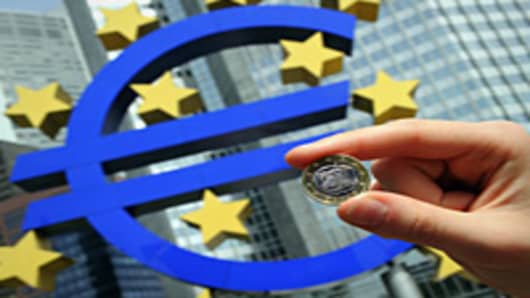Fears over Europe's latest debt crisis may have triggered a higher dollar and a pullback in the stock market, but market pros don't see any long-term strength in the dollar or major threat to US stocks.
With the Federal Reserve flooding the market with money and the International Monetary Fund at the ready with a nearly $1 trillion bailout package, many remain convinced that the trend for the US currency remains lower.
The weaker greenbackhas been considered pivotal in the Fed's strategy to kickstart the slumbering US economy by cheapening assets and lowering interest rates, thus triggering risk-taking.
"In the short run, who knows? Over the intermediate term, greed is going to take investors away from this crisis because I don't think it's a game-changer," said James Paulsen, chief investment strategist at Wells Capital Management in Minneapolis. "This is more about market reaction than it is fundamentals in Europe."
Stocks lately seem to be in throwback mode and could stay that way through at least the end of this year.
The US market has declined more than 3.5 percent since fears have grown over European debt, primarily in Ireland—for now—but likely reverberating onto other euro zone economies including perhaps Spain. Stocks lost more than 1 percent Mondaybut rebounded later in the afternoon.
Simultaneously, the euro has tumbled from its recent high of 1.414 against the dollar to near 1.31 on Monday, a fall of about 7 percent in less than four weeks. The move resembles a similar pattern to April, when fears over Greek debt defaults triggered a soft patch for the market that lasted through most of the summer.
While many market pros remain fairly sanguine about US stocks, there remains fear that the euro has a ways to fall yet.
Hedge fund manager Dennis Gartman, author of The Gartman Letter investment guide, wrote that the euro is "in the process of breaking down" and likely will slide to 1.265-1.275 in the near term.
"These are tectonic plates shifting very, very slowly but doing so inexorably," he wrote. He echoed those comments in an interview on CNBC. (Click here for more)
So if the dollar does continue to weaken, that could present some headwinds for stocks.
At the same time, conventional wisdom would be that commodities would suffer, too. Yet Monday trading actually saw price increases for items such as gold , oil and silver. Dollar-denominated assets generally do well when the greenback is falling in value as that makes them cheaper to purchase with foreign currencies.
The activity could be a sign that some commodities could be losing their sensitivity to dollar movements and trading more strongly on underlying fundamentals.
"We are convinced, as we have been for months," Gartman wrote, "that the driving force behind gold's strength is not inflation nor dollar devaluation but the simple notion that gold has become the world's 3rd most popular 'reservable currency' and that it will soon move past that of the EUR into 2nd place."
But even if the European situation continues to roil markets, gold remains a solid safety investment, said Philip Silverman, managing partner at commodity trading advisor Kingsview Management in New York.
"A flight to safety would be having exposure to gold," Silverman said. "Now, commodities can get soft here based upon the strengthening of the dollar and economic activity. But we're finding that gold can be viewed a commodity and inflation hedge as well as a currency substitute."
Oil prices also are continuing to head higher, which Gartman sees as reflective of global uncertainty in the energy markets—most recently the damage done to relations with Mideast nations following another round of Wikileaks disclosures.
Conversely, Paulsen sees stock prices continuing to rise despite global turmoil such as the European debt situation. He said credit spreads and interest rates are well off the highs experienced in April, indicating that investors are not as nervous as they were when the crisis first broke.
"We're finishing up the second year of what is likely to be double-digit gains in the stock market and up 80 percent from the March 2009 lows," he said. "Yet the whole time it has been going up we've been worrying about one crisis after another. Has it done investors any good to focus on any of these crises, or has it been better to focus on underlying stability?"
Yet much of those gains have been underwritten by loose monetary policy that at some point will have to end to stave off the accompanying inflation from all that money printing.
Weak-dollar policies tend to prevail during economic downturns as a way to ignite an economy by cheapening its goods in world markets. But it is an ultimately unsustainable policy due to the threat of inflation and global trade wars.
So at some point, whether it comes from a flight from the euro or fundamental economic strength, the market will have to show it can justify a stronger dollar.
"The government gifts of stimulus are driving the stock market. There's been an impression that if the economy stays weak the government will keep throwing money in," said Keith Springer, president of Springer Financial Advisors in Sacramento, Calif. "In the long term a strong stock market has to rely on the strong economy—getting people back to work, which means a stronger dollar. Eventually that's what's going to happen."



